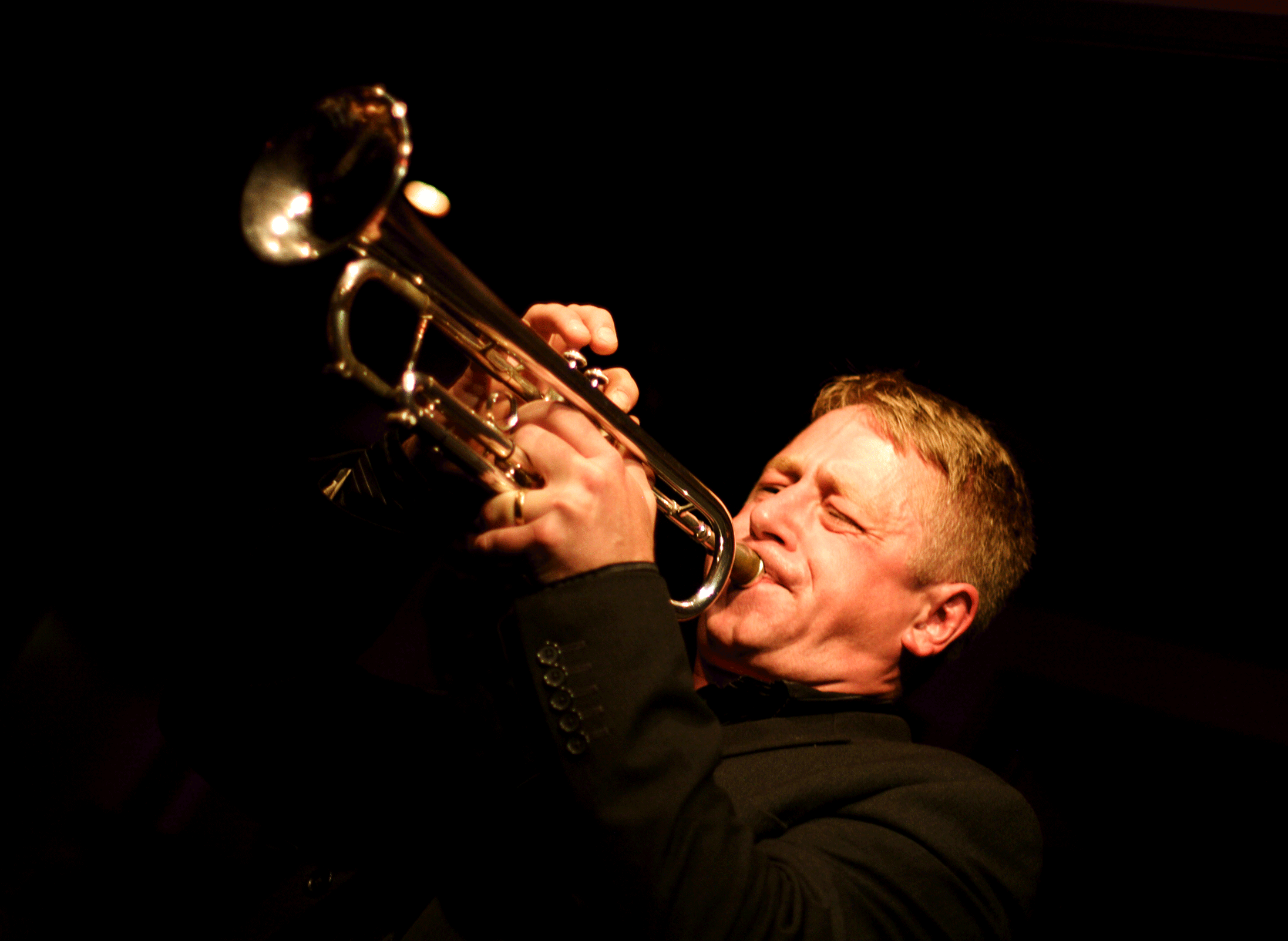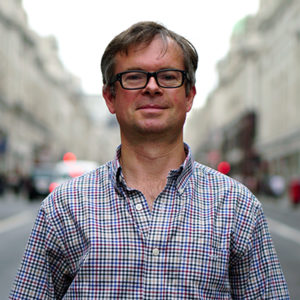Gabriel Garrick Interview

SJM columnist and bassist Eddie Myer recently caught up with trumpeter Gabriel Garrick between sets at the Bristol Bar where he was sitting in at Jack Kendon's regular Thursday night gig.
Hi Gabriel. Your father Michael was an important and influential jazz musician. What was it like growing up in such a musical family? Was a career in music inevitable?
“It was a joyful upbringing because music was around all the time. For me it was a great laugh and joy cos of the lifestyle of a jazz musician. My first gig was probably at the age of 8 when I’d just got a grasp of the cornet … Dad used to take us (me and my brother Chris who played the violin) to gigs from an early age – I think he took us out of school – to go with him and his trio, Dave Green and Trevor Tomkins, to school workshops because he thought it would be more of an inspiration to see a couple of kids playing with the band! My first proper gig was just before I was 10, summer 1981, in the Unicorn Theatre near Leicester Square – there was a weeks matinees of school shows and we did our party pieces, scratching and tooting away! I’ve still got the recording! I suppose it was inevitable, but there was no push or emphasis either way. Dad was very clear that we should get our qualifications – which didn’t necessarily happen – so that we had a choice and there wasn’t a pressure to make a living out of music. But ever since I picked up the cornet I felt that I wanted to play – Dad had a cornet lying around for years, not specifically for me, and got it out for us to try, and Chris tried it but said he got cramps, which I heard as ‘crabs’, so I remember wanting nothing to do with crabs in my lips and wouldn’t go near it! But about six months later I picked it up of my own accord, and then he gave me a tape of Louis Armstrong and that was it! My mum was in the London Philharmonic Choir and played piano and clarinet and was teaching a lot as well, so there was a lot of variety, but Louis was the key.”
So was it always going to be jazz for you?
“I was in local orchestras and I got into a brass band when I was 9, and I remember playing Haydn concertos as a teenager, and it would have been great to continue, but I suppose that when you went into education you got streamlined and it was hard to do both.”
Regarding education – you came form a musical background, you wanted to be a musician because of your Dad and Louis Armstrong…
“And a couple of others I want to mention – Ellington, and Lionel Hampton with Benny Goodman.”
What role do you feel that formal education plays in jazz – either in general or for you specifically?
“Well…. basically, for me jazz is an inherent creative process from yourself – and formal teaching – as opposed to education, which I see as a process of bringing out – formal teaching without a culture to back it up, and without an environment where you’re able to go out and play, can be unbalanced and have negative results. My issue with some jazz is that it’s a niche art form that’s where it’s gone from being popular, it’s been affected because of economics and big bands being too expensive to run. In the 50s Art Blakey could play theatre gigs all around Europe, but now there’s a gulf of separation between the big players and the rest. Why is that? It’s niche, it’s not everyone’s cup of tea, and I think that’s because in part market forces and media influence has changed what people want to listen to. That’s why my dad and his generation hated rock and roll, not for the music but because of what it was doing to the scene and what it was doing to people’s sensitivities as music consumers. Jazz education comes into that, because if there’s no outlet it’s an unbalanced situation – if there’s no outlet, no jazz culture outside education then there’s no meaning to it, and I think that’s more of an issue that we should be trying to address.”
Tell us a bit about the Jazz Academy.
“That was started by Dad in 1989 – Dad was teaching and me and Chris were students! He’d had experience working on the Guildhall jazz course and Jazz at the West London Institute in Twickenham, and in 1980 Johnny Dankworth asked him and a couple of others to join his course – holiday courses for adults. The Jazz Academy is a residential course – I’ve taken it over since Dad died – three times a year, and it’s an oasis where people wanting to play jazz can do it in an environment where there’s no competition or pressure of performance, as there can be at jam sessions. I feel that’s not the way the music came about – I went to New Orleans recently, and it’s not like that. That addresses how I feel about education, and the whole pressure situation of being a musician. In New Orleans I saw a lot of musicians, street players and in little clubs and bars, and no matter how good or bad they were technically – there were a few duffers, or some who maybe were even struggling to get round tunes they didn’t know completely- but they all played with fantastic time, a good feel and a good sound when they could produce it, because they know through the culture that’s embodied there that those are the important things – to nurture your own voice, and do it anyway regardless of what people think of you. There’s a lack of that culture here, but that’s not to say that we can’t be great jazz musicians!”
Talking of jazz in the UK – you’ve just moved from London to Billingshurst and we’re seeing a lot of you in Brighton! How does the jazz scene down here strike you?
“I love it! I think there’s some fantastic musicians, as good as anywhere I’ve known. The lovely thing about Brighton is that it’s smaller and it has an eclectic vibe anyway so people on the streets have an open-mindedness which you can only find in pockets of London. There’s a bigger question – why do people sit at home watching X Factor, rather than going out? Any music like jazz suffers at the hands of the media, but Brighton has that open-mindedness, a freshness and a vitality – there’s a buzz!”
You’ve got a gig coming up at the Verdict – Gabriel Garrick’s Real Jazz. Here’s the big question… what is Gabriel’s Real Jazz?
“For me jazz – all music, but jazz in particular- is absolutely riven through with swing. Everything can swing- Funk can swing, Latin music can swing, it doesn’t matter what the groove is, it’s an inherent thing between individuals in a band. You won’t get it in sequenced electronic made music – it doesn’t swing – it’s dead like that. Real jazz has to have that, and it has to have theme and variation, solos over a form. Jazz nowadays is a definition that means a lot of different things, and there’s nothing wrong with that, but going back to the education side of things, I can hear that there’s a lot of very talented musicians who are lacking in the knowledge, the complete picture of jazz. They might have come in at Wayne Shorter or Kenny Wheeler, and they ignore Louis and Benny Goodman and Ellington because they think it’s old hat; they aren’t into the old stuff. That’s not real jazz to me, because if you study something you should study it completely, from the roots. It doesn’t mean you have to play it that way! So the band is drawing from those roots, because I love that playing and I think it communicates to more people – having been to New Orleans, I’ve seen it! In places like the Spotted Cat in Frenchman Street it’s full of people of all ages, and they’re playing great time, great feel on old tunes like Down By The Riverside or I Can’t Believe That You’re In Love With Me that have a great sense of melody and direction – maybe with bass and guitar or sousaphone, but no intellectual over-harmonising! Just great feel and swing, and it brings people in. Not only do I love it, but I’ve seen how it communicates with people – and I’ve seen it a lot in Brighton as well! My mantra is ‘serving the music’ – you have to be sensitive to what people want to hear. Cannonball Adderley said “we play one for us and three for them”- he knew you have to play what audiences will dig, so they can have a fresh perspective on your new things, rather than subjecting them to a barrage of stuff they don’t understand. Melody speaks!”
What’s your main creative focus at the moment?
“I just did a gig with my big band at the Hideaway Streatham for the London Jazz Festival, and we do regular Sunday afternoon gigs at the Gunnersbury in Chiswick, but I’m learning to try and not try and do too many things at once.It’s hard to sustain a group with regular personnel because everyone needs to take other work for economic reasons. I’m looking forward to the Verdict gig as it’ll be a new band that I think will work together really well and I always enjoy that experience!”
Gabriel Garrick’s Real Jazz is at The Verdict, Brighton on Saturday 14th February.
For more information of Gabriel Garrick:
For information on the Jazz Academy:
This interview appeared in the February 2015 issue of SJM, available here.



